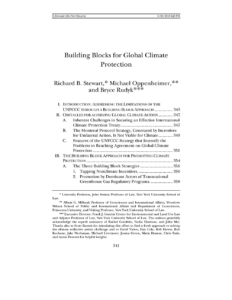This article presents an innovative institutional approach to supplement and ultimately strengthen the lagging United Nations Framework Convention on Climate Change (UNFCCC) process for negotiating a climate treaty that commits major emitting and developed countries to greenhouse gas emissions limitations. The Durban Platform for Enhanced Action does not aim to have such a treaty before 2020, and there remain very serious obstacles to reaching such an agreement even then. In the interim, the only international global climate regulation in force is a substantially weakened Kyoto Protocol. This creates the need and the opportunity for initiating smaller scale and less centralized forms of transnational cooperation for climate protection.
This article articulates three distinct institutional strategies to create a variety of discrete, specialized regimes that will produce reductions in greenhouse gas emissions—a building block approach to climate protection. The several different building block regimes would involve participation by a limited number of governments, subnational jurisdictions, firms, and NGOs. They would coordinate and support specific transnational regulatory, research and development, and financial programs in discrete economic or development sectors or in geographic regions. To enlist participation, these regimes would primarily pursue non-climate objectives that provide economic or other non-climate benefits to the regime members. At the same time, the regimes would be designed so that members’ activities would reduce greenhouse gas emissions. The approach provides incentives for actors to advance their respective interests in ways that would also produce a global public benefit.
The building block approach seeks to advance climate protection by focusing on multiple discrete regimes with a variety of objectives; by limiting the number of participants and at the same time including non-state actors; by focusing on discrete types of activities that provide direct benefits to participants; and by using different modes of governance and representation of interests than those afforded by international law. Through these means, the building block approach reconceptualizes, enriches, and energizes the current global climate regime complex.

